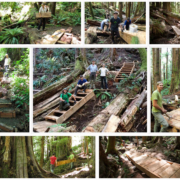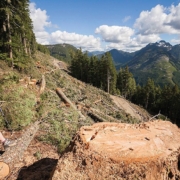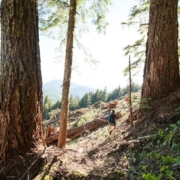Jane Morden and the Watershed Forest Alliance (WFA) have been fighting against logging at McLaughlin Ridge for close to half a decade now, but with city council’s unanimous decision on Monday night to support their efforts they may be one step closer to a solution.
Sarah Thomas, a volunteer with the WFA, presented the group’s concerns to city council and called on the city to support the WFA’s efforts to pause the logging at McLaughlin Ridge and have a conversation with the Ministry of Forests, Lands and Natural Resource Operations as well as landowners Island Timberlands.
The company owns McLaughlin Ridge and is legally permitted to log the old growth trees located there. The area represents a few hundred hectares of the 250,000 ha that Island Timberlands owns.
According to Thomas, the Mclaughlin Ridge old growth lands were identified by the province as areas that should be protected. However by 2004, the lands were removed from the Tree Farm Licence (TFL) and while promises were made to come to some agreement about how the lands would be protected, this never happened.
McLaughlin Ridge, which is about an hour southeast of Port Alberni, is home to a couple of hundred hectares of old growth Douglas Fir as well as the China Creek Watershed, the city’s main water source. Currently, the watershed meets Island Health’s 4-3-2-1-0 water requirements but the concern is that if the old growth is cut down, that might not be the case anymore.
“It’s important to protect [the China Creek Watershed] because you can always treat water but this costs a lot of money and it’s never as good as the original. We would like to make sure that nothing really bad happens to that water,” said Edna Cox of the Save Our Valley Alliance, a public education group.
“It’s designated a community watershed so we’re asked to stay out of the area and yet logging continues,” said Thomas at city council.
While the city does have other, secondary sources of water in Bainbridge Lake and Lizard Lake, China Creek is the best water source that Port Alberni has due to the filtration that the old growth up McLaughlin Ridge provides.
“The water comes down very, very slowly and it’s really well filtered [by the old growth]. If it comes of a bare slope or washes a lot of silt down then it’s not such high quality water,” said Cox.
If a lot of silt is washed down, the amount of sediments in the water increase, as does the turbidity.
“When there’s turbidity there’s a problem because you can’t even treat the water, it doesn’t help,” Cox said.
The old growth also helps keep the city’s water supply steady throughout the year. With the old growth there, the snowpack up on the ridge melts a little slower.
“The forest acts as a sponge so you don’t have all the water coming down in the spring melt and then no water in the summer.
“We’ve had low water conditions now for over a year; we didn’t have much of a snowpack last year either,” said Jane Armstrong, also from the WFA.
Armstrong is not sure what the future holds for Port Alberni’s water supply, but she thinks that with climate change happening that drought conditions will stick around and that instead of rain throughout the year, the watershed will be filled up by occasional huge downpours.
[“If this happens] the forest is a natural solution for helping to control the flow of water,” Armstrong said.
Clearcutting also has another, more immediate danger; landslides. In 2006, clearcuts in the Beauforts, followed by a large amount of precipitation, were thought to have caused landslides that affected Beaver Creek’s water and brought gravel in debris into people’s homes.
There’s a chance that clearcutting on McLaughlin Ridge could lead to the same.
While Island Timberlands is required to replant trees that they cut down—and states that they typically do so within nine months —the high elevation of McLaughlin Ridge means that it will be generations until those replacement trees are big enough to serve any purpose, says Morden.
“This area is at a higher elevation, we’re talking about a thousand metres up, so it’s not going to grow back at a fast rate. Up there, you can have a 20-year-old tree that’s not anywhere much above your waist, said Morden, “and when the roots start to decompose from the huge [old growth trees,] then your chances of landslides are going to increase.”
In an e-mailed statement, Morgan Kennah, Manager of Sustainable Timberlands and Community Affairs for Island Timberlands, said that they “have and continue to work cooperatively with the city to ensure water quality is maintained in China Creek. In cooperation with the Ministry of Environment, we have installed a continuous water quality monitoring station in the watershed to ensure we meet the applicable water quality objectives.”
However, Cox doesn’t think that this is good enough because while “drinking water is protected [that] protection will take precedence when there’s an imminent threat, when it’s basically too late.”
According to Coun. Cindy Solda, the issue has been brought up at the Association of Island and Coastal Communities (AVICC), the Union of British Columbia Municipalities (UBCM) and the Alberni-Clayquot Regional District (ACRD) and that a main goal of these government-led bodies is to change the way private land is regulated.
“One main goal is to get private land and Crown to be the same… we want to have more say,” Solda said.
“[Water] is a human right, we really need to have water,” said Coun. Wendy Kerr, “the forest companies have to know that they don’t own that water, they’re only renting the space, nobody owns this planet but we need to start taking care of it now.”
With that, Kerr raised motions to give city council’s support to the WFA and support the organization’s request to pause the logging at McLaughlin Ridge as well as to request a meeting between council, the WFA, Island Timberlands and the provincial forestry ministry.
City council carried the motion to applause from meeting attendees.
Quick facts:
◆ The first cut done at McLaughlin Ridge was four to five years ago, with a large cut occurring in 2011. Jane Morden of Watershed Forest Alliance says 50 per cent of the old growth remains.
◆ Port Alberni gets its water from the China Creek Watershed, located an hour southeast of the city. McLaughlin Ridge is located at the northern edge of the watershed boundary.
◆ There are two water intake sources within the China Creek Watershed: a creek intake off of China Creek at the western edge of the watershed and a lake intake off of Bainbridge Lake, located slightly northwest of the watershed boundary.
◆ The city primarily uses the creek intake due to its marginally higher water quality. However, if anything were to happen to the creek intake water quality, the city could use the lake intake.
Those two water intakes represent the redundancy in the city’s water supply, which means that it is unlikely that the two sources would both be unusable at the same time, city engineer Guy Cicon said.
◆ Port Alberni’s water is treated with chlorine before being stored in reservoirs. The city is currently in phase one of upgrading their water facilities by adding UV disinfection at a cost of $4 million. There is also the possibility of later adding a filtration system at an additional $3 million.
Read more: https://www.albernivalleynews.com/news/logging-mclaughlin-ridge-watershed-advocates-say-logging-threatens-citys-water-source/




